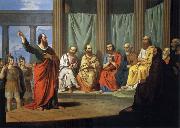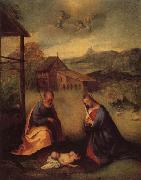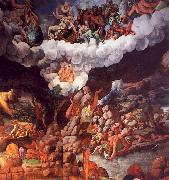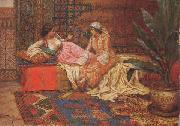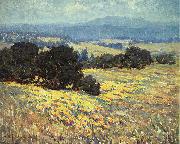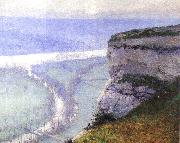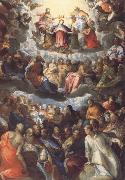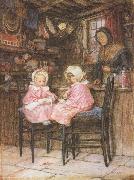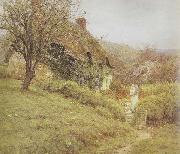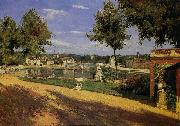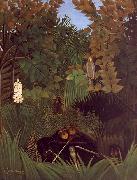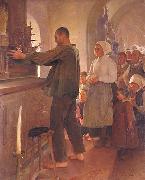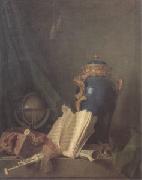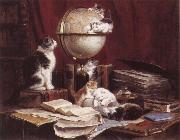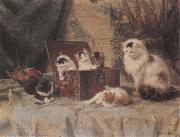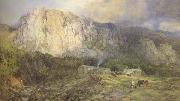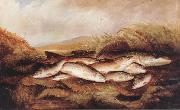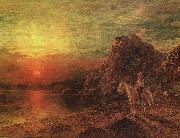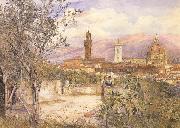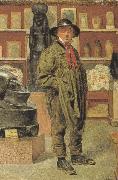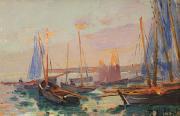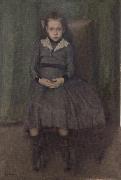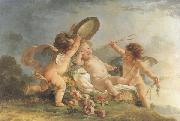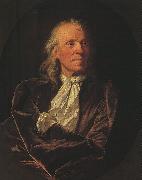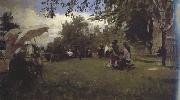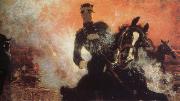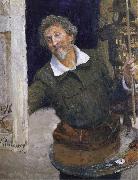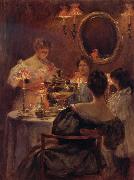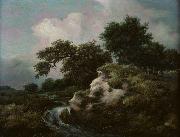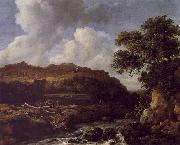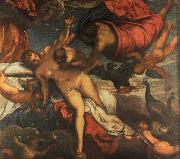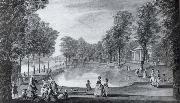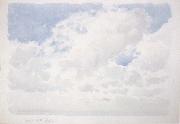|
|
|
|
|
|
|
|
|
|
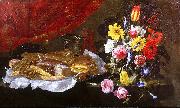 |
Giuseppe Recco
|
|
(1634 - 29 May 1695) was a still life Italian painter.
Born in Naples, he likely apprenticed with his family, including his father Giacomo Recco and uncle Giovan Battista Recco. His children both son Nicolo and daughter Elena were also painters. A large part of his output was painted in Spain, where his assemblies of victuals, both vegetable and animal, were popular. It is claimed he was influenced by the neapolitan Giovanni Battista Ruoppolo.
Recco died at Alicante, Spain. |
|
|
|
|
|
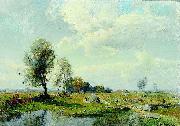 |
Gustaf Rydberg
|
|
painted Skansk slatt med pilvall - motiv fran Viby in 1923
Swedish, 1835-1933 |
|
|
|
|
|
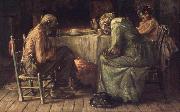 |
Harry Roseland
|
|
(c.1867-1950) was one of the most notable painters of the genre painting school around the turn of the 20th century. An American, Roseland was primarily known for paintings centered on poor African-Americans.
Roseland was largely self-taught, and never traveled to Europe to study art, as did many of the American artists of his time. However, he did receive instruction from John Bernard Whittaker and later, James Carroll Beckwith. One of his most popular subjects were his paintings of black women fortune tellers who read the palms and tea leaves of white women clients. These paintings were widely reproduced during the early 20th century in the form of postcard sets and large full-colour prints that were distributed as Sunday supplements in newspapers. While known most for his paintings of African Americans, his work encompassed many genres, including seascapes and portraits. He also gained renown for his paintings of laborers in the coastal areas of New England and New York and his many interior paintings.
Roseland was born and lived his entire life in Brooklyn. |
|
|
|
|
|
|
|
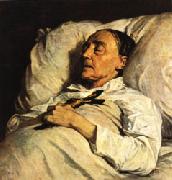 |
Henri Regnault
|
|
Paris 1843 - Buzenval 1871.
French Academic Painter, 1843-1871.
Studied under Alexandre Cabanel.
Specializes in Orientalism. |
|
|
|
|
|
|
|
|
|
 |
Henrietta Rae
|
|
(30 December 1859 - 26 January 1928) was a prominent English painter of the later Victorian era.
Born in Hammersmith, London, she was the youngest of seven children of a civil servant; her mother was musically talented, a former student of Felix Mendelssohn. An uncle, Charles Rae, was an artist and a student of George Cruikshank. Rae began studying art at age thirteen; she was educated at the Queen Square School of Art, Heatherley's School of Art (she was its first female pupil), and the British Museum. She reportedly had to apply to the Royal Academy schools at least five times before she was accepted though she eventually gained a seven-year scholarship. Her teachers there included Frank Bernard Dicksee, William Powell Frith, and Sir Lawrence Alma-Tadema; the last of these had the strongest influence on Rae's later work. She became a frequent exhibitor at the annual Royal Academy shows, beginning in 1881.
She gained recognition and success early in her career, specializing in classical, allegorical, and literary subjects, often treated in a grand style and scale; her Psyche at the Throne of Venus (1894) measured 12 feet by 7 feet (305 by 193 cm) and contained 13 figures. Other paintings in the same classical vein include her Ariadne (1885), Eurydice (1886), Zephyrus and Flora (1888), Apollo and Daphne (1895), Diana and Calisto (1899), and Hylas and the Water Nymphs (1910) among many more. |
|
|
|
|
|
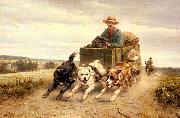 |
Henriette Ronner-Knip
|
|
was a Dutch painter.
Born Henriëtte Knip in Amsterdam, she moved at a young age to Den Bosch and was until 1850 active in Sint-Michielsgestel and Boxtel. That year she married Feico Ronner and moved to Belgium, first to Brussels and in 1878 to Elsene. She studied with her father, Joseph August Knip.
She was best known for her paintings of subjects from nature, especially cats and dogs.
|
|
|
|
|
|
|
|
 |
Henry Redmore
|
|
Henry Redmore was born in Hull in 1820. He lived his whole life in the North East of England, with his studio in Hull. Along with John Ward, Redmore was one of the best painters of the Hull School, although the two artists had distinctly different techniques |
|
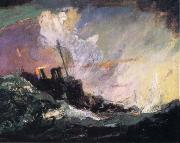 |
Henry Reuterdahl
|
|
American, 1871-1925
He was best known for his paintings of Navy warships and recruiting posters for World War |
|
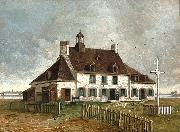 |
Henry Richard S. Bunnett
|
|
1845 -1910
David Ross McCord (1844-1930) commissioned Henry Richard S. Bunnett (1845-1910) to paint over 200 oil paintings between 1885 and 1889. The works depicted buildings, views and places around Quebec that McCord felt were of historical importance. |
|
|
|
|
|
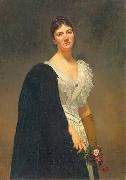 |
Henryk Rodakowski
|
|
(1823-1894) was a Polish painter.
He was befriended by the painter and activist Leon Kaplinski.
|
|
|
|
|
|
Hoca Ali Rıza
|
|
(1858 - 1939) was a Turkish painter.
Portrait of Hoca Ali Riza
Kizkulesi (Leander Tower), painting by Hoca Ali RizaBorn in Uskudar, Istanbul. Painted many landscapes of Istanbul and especially Uskudar. Attended Kuleli Military High School and then the Military Academy. There he studied under Osman Nuri Pasha, Seleyman Seyyid and Monsieur Gues, and graduated in 1884. From 1909 to 1912 he served as President of the Society of Ottoman Painters.
|
|
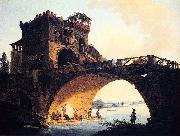 |
Hubert Robert
|
|
(22 May 1733 - 15 April 1808), French artist, was born in Paris.
His father, Nicolas Robert, was in the service of François-Joseph de Choiseul, marquis de Stainville a leading diplomat from Lorraine. Young Robert finished his studies with the Jesuits at the College de Navarre in 1751 and entered the atelier of the sculptor Michel-Ange Slodtz who taught him design and perspective but encouraged him to turn to painting. In 1754 he left for Rome in the train of Étienne-François de Choiseul, son of his father's employer, who had been named French ambassador and would become a Secretary of State for Foreign Affairs to Louis XV in 1758.
|
|
|
|
|
|
|
|
|
|
|
|
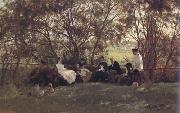 |
Ilya Repin
|
|
Ukrainian-born Russian Realist Painter, 1844-1930 |
|
|
|
|
|
|
|
|
|
|
|
|
|
|
|
|
|
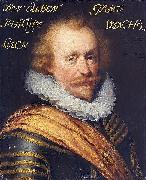 |
Jan Antonisz. van Ravesteyn
|
|
(1572(?) - buried June 21, 1657) was a successful painter to the Dutch court in The Hague.
Van Ravensteyn was born in The Hague. It is unknown who taught him how to paint, but he was a follower of the Delft portrait painter Michiel Jansz van Mierevelt. Van Ravesteyn is mentioned there in the city archives 1597. From 1598 until his death he lived in the Hague, where in 1598 he became a member of the Guild of St. Luke of the Hague. In 1604 he married Anna Arentsz van Berendrecht and in the same year he was mentioned as a good painter by Karel van Mander (though his earliest dated works are from 1611). In 1608 he bought a house on the Molstraat and in 1628 he moved in the Molstraat. In 1640 his wife was buried and in the same year his daughter Marie married one of his pupils, the painter Adriaen Hanneman. In 1654 he moved to the Nobelstraat next to the house of his daughter. In 1656 he left the guild with a group of dissatified painter friends and was one of the founders of the Confrerie Pictura. He was a Catholic and his name occurs often as a witness in the records of the church in the Molstraat, such as for the marriage of his daughter Agnes in 1641 with Willem van Culemborgh. His portrait was painted by Sir Anthony van Dyck and he produced Schutterstuk works. His workshop produced many portraits for the royal house of Nassau and he competed with Miereveld for several commissions.
Van Ravesteyn was in turn, the teacher of Dirck Abrahamsz., Leendert Barthouts, Johannes Harmensz. Borsman, Aelbert Dircksz. Coeppier, Pieter Craen, Jacob Dirksz. van den Enden, Fransise de Goltz, Adriaen Hanneman, Barent Jansz., Thomas Ouwater, Clement Ram, Jan Rassenbourch, Frederick Sonnius, Dirck Verlaer, Jan Pous Voet and Pauwels Willemsz.
|
|







